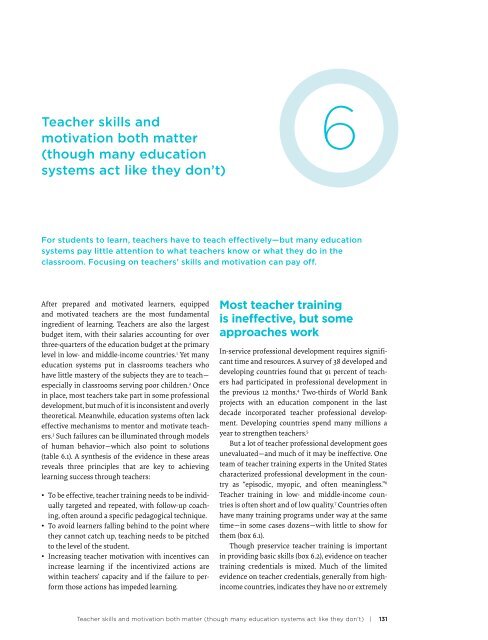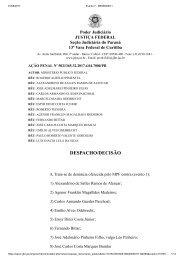Brasil só deve dominar Leitura em 260 anos, aponta estudo do Banco Mundial Relatorio Banco Mundial _Learning
You also want an ePaper? Increase the reach of your titles
YUMPU automatically turns print PDFs into web optimized ePapers that Google loves.
Teacher skills and<br />
motivation both matter<br />
(though many education<br />
syst<strong>em</strong>s act like they <strong>do</strong>n’t)<br />
6<br />
For students to learn, teachers have to teach effectively—but many education<br />
syst<strong>em</strong>s pay little attention to what teachers know or what they <strong>do</strong> in the<br />
classroom. Focusing on teachers’ skills and motivation can pay off.<br />
After prepared and motivated learners, equipped<br />
and motivated teachers are the most fundamental<br />
ingredient of learning. Teachers are also the largest<br />
budget it<strong>em</strong>, with their salaries accounting for over<br />
three-quarters of the education budget at the primary<br />
level in low- and middle-income countries. 1 Yet many<br />
education syst<strong>em</strong>s put in classrooms teachers who<br />
have little mastery of the subjects they are to teach—<br />
especially in classrooms serving poor children. 2 Once<br />
in place, most teachers take part in some professional<br />
<strong>deve</strong>lopment, but much of it is inconsistent and overly<br />
theoretical. Meanwhile, education syst<strong>em</strong>s often lack<br />
effective mechanisms to mentor and motivate teachers.<br />
3 Such failures can be illuminated through models<br />
of human behavior—which also point to solutions<br />
(table 6.1). A synthesis of the evidence in these areas<br />
reveals three principles that are key to achieving<br />
learning success through teachers:<br />
• To be effective, teacher training needs to be individually<br />
targeted and repeated, with follow-up coaching,<br />
often around a specific pedagogical technique.<br />
• To avoid learners falling behind to the point where<br />
they cannot catch up, teaching needs to be pitched<br />
to the level of the student.<br />
• Increasing teacher motivation with incentives can<br />
increase learning if the incentivized actions are<br />
within teachers’ capacity and if the failure to perform<br />
those actions has impeded learning.<br />
Most teacher training<br />
is ineffective, but some<br />
approaches work<br />
In-service professional <strong>deve</strong>lopment requires significant<br />
time and resources. A survey of 38 <strong>deve</strong>loped and<br />
<strong>deve</strong>loping countries found that 91 percent of teachers<br />
had participated in professional <strong>deve</strong>lopment in<br />
the previous 12 months. 4 Two-thirds of World Bank<br />
projects with an education component in the last<br />
decade incorporated teacher professional <strong>deve</strong>lopment.<br />
Developing countries spend many millions a<br />
year to strengthen teachers. 5<br />
But a lot of teacher professional <strong>deve</strong>lopment goes<br />
unevaluated—and much of it may be ineffective. One<br />
team of teacher training experts in the United States<br />
characterized professional <strong>deve</strong>lopment in the country<br />
as “episodic, myopic, and often meaningless.” 6<br />
Teacher training in low- and middle-income countries<br />
is often short and of low quality. 7 Countries often<br />
have many training programs under way at the same<br />
time—in some cases <strong>do</strong>zens—with little to show for<br />
th<strong>em</strong> (box 6.1).<br />
Though preservice teacher training is important<br />
in providing basic skills (box 6.2), evidence on teacher<br />
training credentials is mixed. Much of the limited<br />
evidence on teacher credentials, generally from highincome<br />
countries, indicates they have no or extr<strong>em</strong>ely<br />
Teacher skills and motivation both matter (though many education syst<strong>em</strong>s act like they <strong>do</strong>n’t) | 131








